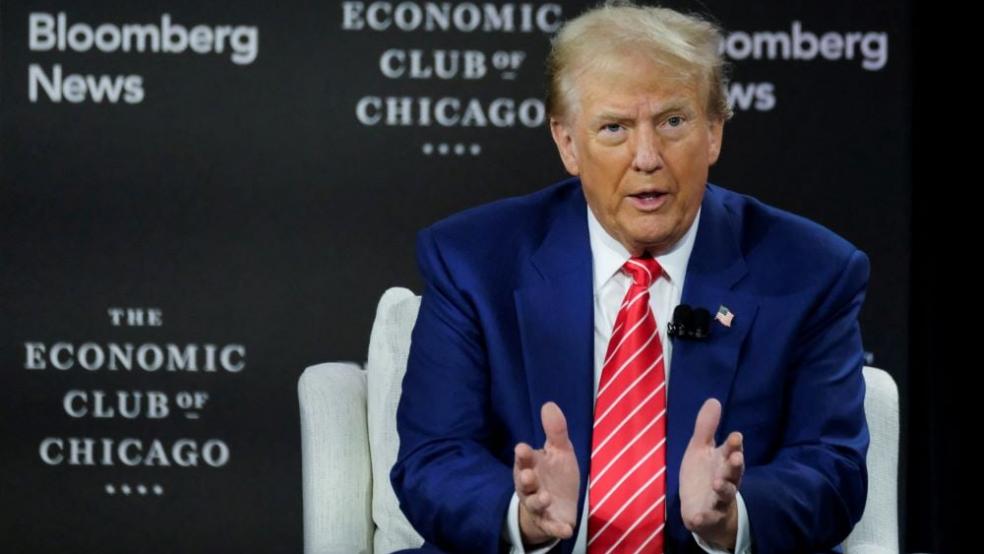Former President Donald Trump sparred with the editor-in-chief of Bloomberg News Tuesday during an interview focused largely on economic policy and tariffs.
In an interview at the Economic Club of Chicago, Bloomberg Editor-in-Chief John Micklethwait began by asking Trump about a recent estimate from the Committee for a Responsible Federal Budget that said that Trump’s plans would add $7.5 trillion to the national debt over a decade.
Trump responded by promising to lower taxes for companies that make their products domestically and to impose protectionist tariffs. “I’m a believer in tariffs,” Trump said, adding, “To me, the most beautiful word in the dictionary is tariff, and it’s my favorite word.”
Micklethwait pressed Trump on the issue, pointing to another estimate of how much revenue the proposed tariffs would raise — “that’s barely the cost of two of your promises,” he said — and warning that Trump’s plans would wipe out trade with China and have costly economic effects.
“You look at the American economy, 40 million jobs rely on trade, it accounts for 27% of GDP,” Micklethwait said. “If you cut that off, that’s also going to have an effect on many, many businesspeople here. Tariffs also have another side. Isn’t that something that you have to acknowledge?” He added that Trump “could be plunging America into the biggest trade war since Smoot-Hawley,” referring to tariffs imposed in 1930, which economists widely believe worsened the Great Depression.
Trump said that there would be no tariffs if companies bring their manufacturing back to the United States. “It’s going to be a positive effect,” Trump said before taking a jab at the newsman. “It must be hard for you to spend 25 years talking about tariffs as being negative and then have somebody explain to you that you’re totally wrong.”
Trump went on to dispute the idea, raised by critics, that tariffs would amount to a national sales tax on $3 trillion worth of annual imports, driving up costs for consumers. “The higher the tariff, the more likely it is that the company will come into the United States and build a factory in the United States so it doesn’t have to pay the tariff,” Trump argued. He added that making tariffs “so high, so horrible, so obnoxious” would bring companies into the United States right away.
Micklethwait then asked about the effect tariffs would have on foreign policy. He suggested that Trump’s tariffs would upset important geopolitical allies. “How does it help you take on China turning all of your allies against you?” he asked.
Trump said our some of our allies have taken advantage of the U.S. more than our enemies.
What economists say: Economists have consistently warned that Trump’s tariffs would drive up consumer costs and raise inflation — and they’ve projected that the proposed tariffs would generate far less than needed to cover the costs of the former president’s tax cut plans and other policy proposals.
In a Wall Street Journal survey conducted this month, 34 out of 50 economists said that prices would rise faster under Trump than under Vice President Kamala Harris, and 32 out of 49 economists said that Trump would put more upward pressure on federal deficits. Just 18 out of 49 economists said that Trump’s policies would lead to greater economic growth than Harris’s.
“Economists still say Trump’s policies are more likely to add to inflation, deficits and interest rates,” the Journal reported. “If anything, the margin has grown since July,” when President Joe Biden was still in the race.
An updated analysis of Trump’s plans by the right-leaning Tax Foundation finds that his basic tax proposals would increase the deficit by $3 trillion over 10 years (before added interest costs) — but that total would climb to about $6 trillion if Trump would exempt tips and overtime pay from payroll taxes, eliminate taxes for Americans living abroad, and expand the Child Tax Credit.
The analysis warns: “Trump’s reliance on import tariffs to offset the cost of tax cuts comes with major downsides. Tariffs are a particularly distortive way to raise revenue, especially as they invite foreign retaliation.” It estimates that Trump’s tariff and expected retaliation from trading partners would offset more than two-thirds of the economic gains they project from his tax cuts.
The analysis also finds that Trump’s proposed tax cuts would provide a greater benefit to higher earners while his tariffs would hit lower- and middle-income taxpayers harder.
Their bottom line: “Our estimates illustrate that Trump’s proposed tariffs threaten to offset much of the economic benefits of his proposed tax policy changes, and of those proposed tax policy changes, many move in the opposite direction of simple, pro-growth, and fiscally responsible tax reform.”






